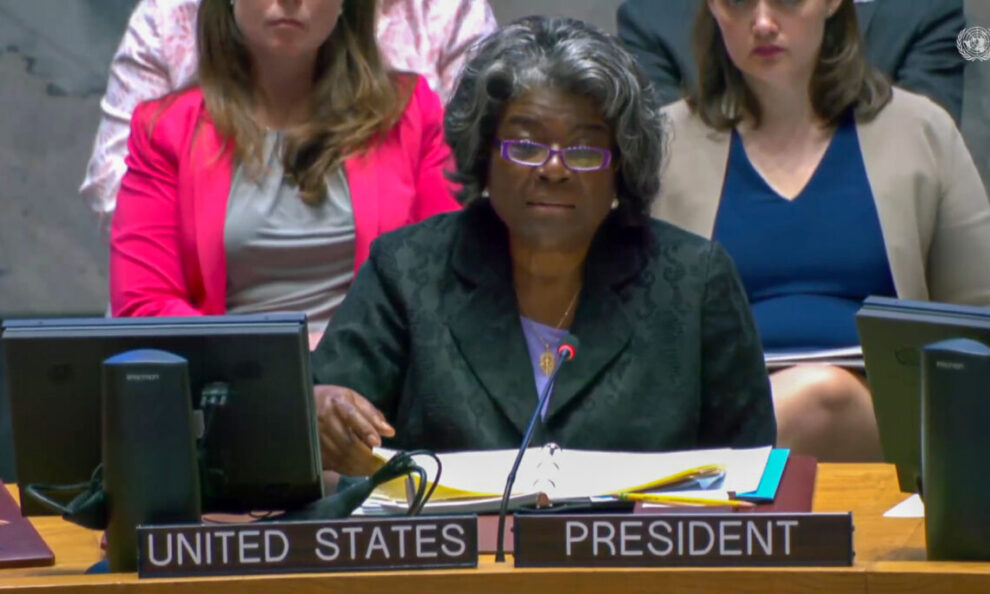Colleagues, the United States continues to believe Israelis and Palestinians alike deserve equal measures of security, prosperity, and freedom. We are committed to a two-state solution and will continue to pursue steps aimed at promoting a comprehensive, just, and lasting peace between Israelis and Palestinians. But ongoing violence sets back the prospects for peace and is responsible for so much needless suffering.
The United States is deeply concerned by the levels of violence in Israel, the West Bank, and Gaza – including violence in Gaza that resulted in the temporary closure of the Erez crossing. We express our condolences for those injured or killed in the past month across Israel, the West Bank, and Gaza.
The United States welcomes all efforts to de-escalate the ongoing violence and we call on all parties to refrain from actions and rhetoric that further inflames the tensions – including hateful rhetoric, settlement activity, evictions, the demolition of Palestinian homes, terrorism, incitement to violence, and payments to the families of terrorists.
On the topic of hateful rhetoric, I want to reiterate that the United States condemns President Abbas’s blatantly antisemitic remarks in August, which wrongly maligned the Jewish people and distorted the Holocaust. These kinds of divisive and hateful remarks only undermine prospects for peace between Israelis and Palestinians.
Colleagues, the sharp rise in violence by extremist Israeli settlers against Palestinians is also deeply alarming. All perpetrators of violence against civilians, whether Israeli or Palestinian, should be held accountable according to the law. Make no mistake: the expansion of settlements undermines the geographic viability of a two-state solution, exacerbates tensions, and further harms trust between the two parties.
The United States strongly opposes the advancement of settlements and urges Israel to refrain from this activity. We take the issue very seriously, as it undermines the possibility of a future contiguous Palestinian state, and we raise it at the highest levels on a consistent basis.
I also want to reiterate that the United States firmly supports the preservation of the historic status quo with respect to the holy sites in Jerusalem. And we oppose actions that depart from the historic status quo, or otherwise disturb the sanctity of these sites. Such action is unacceptable.
Colleagues, we continue to engage with Israel and the Palestinian Authority to promote steps to lower tensions and restore goodwill. To that end, we welcome ongoing consultations by Israel, the Palestinians, and regional partners aimed at convening a meeting soon in the important Aqaba/Sharm format.
As we work toward long-term stability, we must also continue to support the immediate needs of Palestinian refugees. Last week, I was pleased to announce nearly $73 million in additional contributions to UNRWA. Even with this pledge, and other pledges made at last week’s Ministerial, we remain deeply concerned UNRWA will not be able to operate through the end of the year. And we call on all donors to provide additional assistance as soon as possible.
Colleagues, as we speak, actors – including Iran and Hizballah – are working to undermine peace and stability in the region. When the Security Council overwhelmingly supported the renewal of the UNIFIL mandate, we reaffirmed our commitment to ensure those forces do not prevail.
As we emphasized in our explanation of vote on August 31st, the United States – as a steadfast partner of Lebanon – calls on the government to take additional steps to ensure the full implementation of the UNIFIL mandate, consistent with the terms of the Status of Forces Agreement. That includes additional steps to mitigate any restrictions on UNIFIL’s freedom of movement and as previously noted, we also sanctioned Green Without Borders for their support to Hizballah on August 16th.
Furthermore, the United States’ vote to renew UNIFIL did not change any other aspect of U.S. policy, including as pertains to the status of the Golan Heights. Our policy in this regard remains unchanged from 2019.
In closing, I want to express the United States’ continued support for efforts to normalize relations between Israel, its neighbors, and other countries in the region. We are hopeful the next iteration of the Negev Format will soon be convened at the ministerial level and will further advance regional integration initiatives.
Colleagues, there is no shortage of challenges facing the region, which makes this Council’s engagement all the more important and urgent. Let us work together to advance peace, dialogue, and a brighter future for all.
Source : US Embassy










